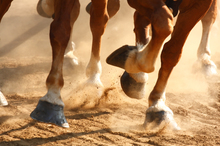On September 24, the Animal Health Foundation (AHF) Board of Directors voted to expand the scope of the organization’s laminitis research by initiating investigation into a new frontier of the insulin-related form of so-called “metabolic” laminitis in horses.

Preventing high insulin levels in horses
Until recent years, excess insulin was not considered a health problem in horses, and it has only been recently that insulin was found to play the key role in the common low-grade metabolic form of laminitis.
AHF will begin this initiative immediately by funding a $70,000 grant to Professor Martin Sillence of the Queensland University of Technology (QUT) in Australia to study how incretins affect the horse’s pancreas in its production of insulin in response to sugar.
Incretins are tiny peptides produced in the horse's intestine in response to eating sugar. They travel via the bloodstream to the pancreas to stimulate increased production of insulin. This is the basis for the Animal Health Foundation’s previous research to develop a simple “Oral Sugar Test”: horses that are likely to develop the metabolic form of laminitis have a higher insulin response after a dose of oral sugar.
“After we understand how incretins are working in the horse, the ideal outcome would be to develop laminitis prevention strategies based on controlling the production of insulin by regulating the incretin response to eating carbohydrates,” said AHF President Donald M. Walsh, DVM, of Pacific, Missouri. “If we can control insulin levels in the horse, we can prevent this common form of laminitis.”
Until recent years, excess insulin was not considered a health problem in horses, and it has only been recently that insulin was found to play the key role in the common low-grade metabolic form of laminitis.
The Animal Health Foundation has played a key role in funding research on this form of laminitis, primarily at the Australian Equine Laminitis Research Unit at the University of Queensland.
The Animal Health Foundation recommends that horse owners who find their horses suffering from low-grade, chronic bouts of laminitis ask their veterinarians to test the horse for insulin and ACTH levels.
ACTH is another hormone that can be active in horses with laminitis and is related to Cushings syndrome.
Progress is being made at the management level to help horses shown to suffer from elevated insulin production. With some effort and creativity, dedicated horseowners across the United States are utilizing feed, grazing, exercise and hoofcare solutions so that many laminitis-prone horses are successfully avoiding laminitis and enjoying a healthier, more active life.
The root of the problem remains poorly understood, and a solution for preventing elevated insulin levels is needed.
Dr. Walsh answers questions about incretins and equine insulin research on the AHF website.
The Animal Health Foundation is a 501 (c) (3) all-volunteer non-profit organization dedicated solely to identifying and funding critical research into the disease of laminitis in horses.
AHF can only function as the leader in laminitis research funding with your help. AHF puts together donations large and small from horse owners, veterinarians, farriers, and any individual who wants to make a difference in beating this terrible disease in horses. All donations go directly to laminitis research.
To add your support to AHF efforts, visit the AHF donation website
